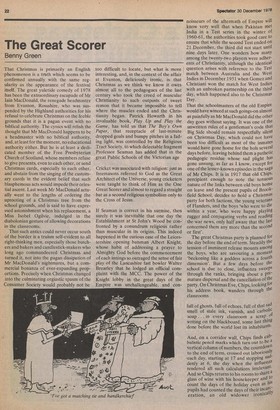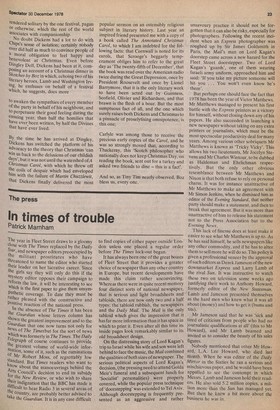The Great Scorer
Benny Green
That Christmas is primarily an English phenomenon is a truth which seems to be confirmed annually with the same regularity as the appearance of the festival itself. The great yuletide comedy of 1978 has been the extraordinary escapade of Mr lain MacDonald, the renegade headmaster from Evanton, Rossshire, who was suspended by the Highland authorities for his refusal to celebrate Christmas on the feeble grounds that it is a pagan event with no biblical authority. The cynics will relish the thought that Mr MacDonald happens to be a headmaster with no biblical authority, and, at least for the moment, no educational authority either. But he is at least a dedicated member of the Free Presbyterian Church of Scotland, whose members refuse to give presents, even to each other, or send Christmas cards, especially to each other, and abstain from the singing of the customary carols in the evident belief that such blasphemous acts would impede their celestial ascent. Last week Mr MacDonald actually went to the lengths of ordering the uprooting of a Christmas tree from the school grounds, and is said to have expressed astonishment when his replacement, a Miss Isobel Ogilvie, indulged in the diabolonian gesture of allowing decorations in the classrooms.
That such antics could never occur south of the border is a truism self-evident to all right-thinking men, especially those butchers and bakers and candlestick-makers who long ago commandeered Christmas and turned it, not into the pagan dissipation of Mr MacDonald's nightmares, but a commercial bonanza of ever-expanding proportions. Precisely when Christmas changed into the culminating orgiastic spasm of the Consumer Society would probably not be too difficult to locate, but what is more interesting, and, in the context of the affair at Evanton, deliciously ironic, is that Christmas as we think we know it owes almost all to the pedagogues of the last century who took the creed of muscular Christianity to such outposts of sweet reason that it became impossible to tell where the muscles ended and the Christianity began. Patrick Howarth in his invaluable book, Play Up and Play the Game, has told us that The Boy's Own Paper, that receptacle of last-minute dropped goals and bumpy pitches in a fading light, was controlled by the Religious Tract Society, tti which delectable fragment Professor Seaman has added that in the great Public Schools of the Victorian age Cricket was associated with religion: just as freemasons referred to God as the Great Architect of the Universe, young cricketers were taught to think of Him as the One Great Scorer and almost to regard a straight bat as a second religious symbolism only to the Cross of Jesus.
If Seaman is correct in his surmise, then surely it was inevitable that one day the Establishment at St John's Wood be confronted by a conundrum religious rather than muscular in its origins. This indeed happened in the curious case of the Leicestershire opening batsman Albert Knight, whose habit of addressing a prayer to Almighty God before the commencement of each innings so outraged the sense of fair play of the Lancashire fast bowler Walter Brearley that he lodged an official complaint with the MCC. The power of the Knight lobby in the great days of the Empire was unchallengeable, and con noisseurs of the aftermath of Empire will know very well that when Pakistan met India in a Test series in the winter of 1960-61, the authorities took good care to ensure that while the second Test ended on 21 December, the third did not start until nine days later. One wonders how manY among the twenty-two players were adherents of Christianity, although the identical question arises with reference to the Test match between Australia and the West Indies in December 1951 when Gomez and Christiani won the match for West Indies with an unbroken partnership on the third day, which happened also to be Christmas Day.
That the schoolmasters of the old Empire would have winced at such goings-on almost as painfully as Mr MacDonald did the other day goes without saying. It was one of the unwritten rules of a gentleman's code that • Big Side should remain respectfully silent on Christmas Day, which could not have been too difficult as most of the inmates would have gone home for the hots several days before, leaving behind them a pathetic pedagogic residue whose sad plight has gone unsung, as far as I know, except for one of the lesser-known episodes in the saga of Mr Chips. It is in 1917 that old Chips, percipient enough to note the tenuous nature of the links between old boys home on leave and the present pupils of Brookfield School, decides to hold a Christmas party for both factions, the young veterans of Flanders, and the boys 'who were to die within a year, who were happy playing rugger and conjugating verbs and reading the war news, only half aware that the last concerned them any more than the second or first'.
The great Christmas party is planned for the day before the end of term. Steadily the tension of imminent release mounts among the boys, who are savouring a moment 'beckoning like a goddess across a fourth dimension'. But a few days before the school is due to close, influenza sweePs through the ranks, bringing about a premature dispersal and the cancellation of the party. On Christmas Eve, Chips, looking for his address book, wanders through the classrooms full of ghosts, full of echoes, full of that sae' smell of stale ink, varnish, and carbolic soap. . . in every classroom a scrap . °f writing on the blackboard, some last thing done before the world lost its inhabitants.
And, on a corridor wall, Chips finds cabbalistic pencil marks which turn out to be a vertical column of numbers, the countdown to the end of term, crossed out laborioaslY -each day, starting at 17 and stopping suddenly at 6, the day when the influenza rendered all such calculations irrelevant' And so Chips returns to his rooms to share a glass of wine with his housekeeper and tO count the days of the holiday even as Ills pupils had counted the days of their incarceration, an old widower ironicalll rendered solitary by the one festival, pagan or otherwise, which the rest of the world associates with companionship. No doubt Dickens had a lot to do with Chips's sense of isolation; certainly nobody ever did half as much to convince people of a moral obligation to feel happy and benevolent at Christmas. Even before Dingley Dell, Dickens had been at it, composing an account of a Christmas dinner in Sketches by Boz in which, echoing two of his literary heroes, Lamb and Washington Irving, he enthuses on behalf of a festival Which, he suggests, does more to awaken the sympathies of every member of the party in behalf of his neighbour, and to perpetuate their good feeling during the ensuing year, than half the homilies that have ever been written, by half the Divines that have ever lived.
By the time he has arrived at Dingley, Dickens has switched the platform of his advocacy to the theory that Christmas 'can Wm us back to the delusions of our childish days', but it was not until the watershed ofA Christmas Carol, with which he threw off the coils of despair which had enveloped him with the failure of Martin Chuzzlewit, that Dickens finally delivered the most popular sermon on an ostensibly religious subject in literary history. Last year an inspired friend presented me with a copy of a book called The Annotated Christmas Carol, to which I am indebted for the following facts: that Cornwall is noted for its carols, that Scrooge's beggarly temperament obliges him to refer to the great day as 'The twenty-fifth of December', that the book was read over the American radio twice during the Great Depression, once by President Roosevelt and once by Lionel Barrymore, that it is the only literary work to have been acted out by . Guinness, Scofield, Olivier and Richardson, and that brawn is the flesh of a boar. But the most sumptuous fact of all, and the one which surely raises both Dickens and Christmas to a pinnacle of proselytising omnipotence, is this one.: Carlyle was among those to receive the precious early copies of the Carol, and he was so strongly moved that, according to Thackeray, this 'Scotch philosopher who nationally does not keep Christmas Day, on reading the book, sent out for a turkey and asked two friends to dine — this is a fact'.
And so, as Tiny Tim nearly observed, Boz bless us, every one.























































 Previous page
Previous page